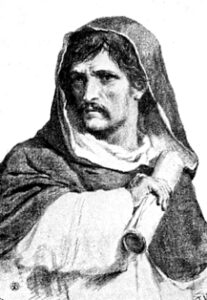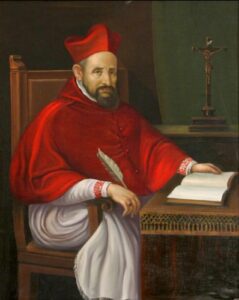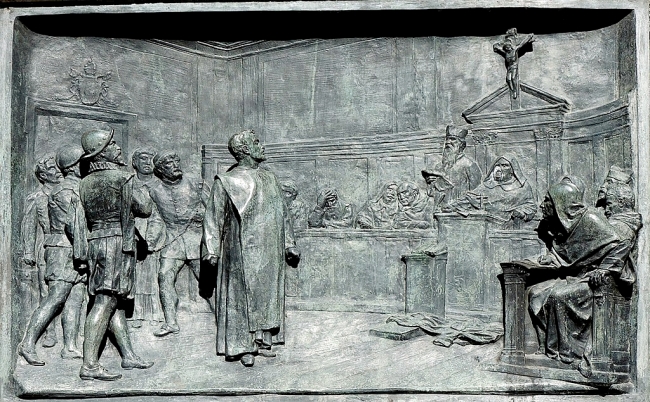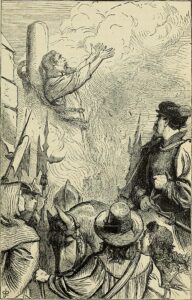“For six years we have met each day in this fetid, filthy dungeon,” announced the Inquisitor, “and for what purpose? Things did not have to come to this pass.”

The man whom the Inquisitor addressed was Giordano Bruno – Dominican friar, philosopher, mathematician, poet, and astrologer, The man addressing Bruno was Cardinal Bellarmine, appointed chief inquisitor by Pope Clement VIII. The two men were seated in a cell in the inquisition prison located within view of the Vatican. The date was February 16, 1600, just hours before the appointed time of Bruno’s execution.
“That’s where you’re wrong,” said Bruno. “There was never another outcome but this one.”
“I respectively disagree,” protested the Cardinal. “Look at your friend Galileo. He recanted his heresies and now enjoys a fine meal and a walk in the open air. You, on the other hand, are all bones. The rats chew off your toes.”
It was true that his years in the dungeon had taken a toll on Bruno. He’d been starved, flayed, and burned with searing metal pincers. The foul and rank vapors had been conducive to producing disease. Even now he had a nagging cough that refused to subside.
“Galileo is a coward,” Bruno announced. “Besides, how does a person recant the truth?”
“Ah, that’s just it,” said the Cardinal. “Galileo is a reasonable man who saw the error of his ways in time to save his life. He acknowledged that the Church possesses infallible truth.”
“Tell me, Cardinal,” said Bruno, “how Galileo came to recant the incontestable evidence before his eyes?”
“The Devil causes the eye to trick itself,” said the prelate. “The truth remains immutable.”
“Then how do you explain the Church’s mutability on res terra, that is, the nature of the Earth?”
“To what specifically do you refer?” asked the Cardinal.
“I refer to the Church’s longstanding position that the Earth is flat even though Aristotle debunked the notion more than two thousand years ago.”
“I don’t recall Aristotle’s having done that.”
The Cardinal wore a look of confusion on his face as if trying to summon a recollection of something he’d never learned in the first place. The Cardinal was decked out in full regalia, colored pipings and buttons announcing his rank in the ecclesiastical hierarchy. He wore a cassock made entirely of watered silk, a purple fascia, and a gilt pectoral cross. He smelled of rosewater, undoubtedly the result of a bath given him by a young girl, or, more likely, boy, earlier that morning. By contrast, Bruno sat in rags barely covering his loins. In the absence of soap and water, he’d long ago grown accustomed to his own stench, now indistinguishable from the putrid odor of dung and the pungent foulness of urine in slop buckets, not removed for days, in some cases. Bruno’s filthy condition had not diminished his mind’s ability to remember the teachings of Aristotle, however.
“Aristotle not only proved that the Earth was a spheroid, but he did so by exercising both operations of logic and observation,” Bruno explained.

It was the same each time they met. The Cardinal came tending to correct Bruno’s thinking in matters of divinity only to find himself embarrassingly inadequate in matters of natural philosophy. The Cardinal pretended to know what he didn’t. That, and the fact he was gullible, made him an unwitting victim of Bruno’s barbs and casuistical assaults. Until meeting Cardinal Bellarmine, Bruno had never met an obtuse Jesuit. He could now say that he had. Bruno was forced to conclude that even a jackdaw could be taught Latin. If true to himself, he would have to admit that confounding the oafish cleric was one of Bruno’s chief pleasures in life, even while chained to the wall of a dungeon.
“What did Aristotle observe,” asked the Cardinal, “that possibly led him to conclude that the Earth was round?”
“Aristotle realized that a lunar eclipse occurred between the sun and moon. The shape of the Earth’s shadow, Aristotle observed, was round. If the Earth were flat, its shadow would have a much different form.”
“Ah, both you and Aristotle miss the point of such occultations,” said the Cardinal. “An eclipse is a warning from God to sinners whose eyes are blind to the light of truth. Darkness is a precursor of the fate awaiting benighted souls in the afterlife in the event they fail to repent in this life.”
How Bruno had endured the Cardinal’s profound ignorance for so long was a miracle of grace – enduring proof of God’s existence, to Bruno’s thinking.
“An eclipse is the result of the natural operation of planets,” Bruno insisted.
“It is only the will of God that prevents the heavenly orbs from tumbling to earth from their fixed points in the sky,” the Cardinal protested.
“Your statement violates every canon of reason,” Bruno objected.

“Damn your reason!” Cardinal Bellarmine thundered. “Reason is the crutch on which the edifice of your shaky position stands when faith alone should guide your every thought, word, and deed. We’ll see how much reason comforts you after tomorrow when your soul writhes in hellfire.”
“What you call faith, I term superstition,” Bruno responded calmly. “Moreover, hell is a myth created by the Church to terrify and control illiterate peasants whose knowledge of hell is limited to this sphere of existence.”
“Heresy!” the Cardinal boomed.
“If it is heresy, then it is a heresy first promulgated by such Church fathers as Clement of Alexandria and Origen as early as the third century. Not to mention the non-canonical gospel of Mary Magdalene who assures us that Our Lord freed all souls from bondage, making hell utterly unnecessary.”
“Statements like those are why you will be burned at the stake before sunset tomorrow if you do not recant your blasphemies and confess your sins. You would do well not to recite the dubious words of the whore, Magdalene.”
“She was no whore,” Bruno insisted. “She was Jesus’ wife and his chiefest apostle.”
“Have it your way.” The Cardinal snarled, slapping his thigh in disgust. “You are the chiefest among sinners and have dug your own grave. No less than the Holy Father sent me to wrangle a confession out of you even though I told him that all such attempts would be useless. I said that if six years in this dungeon had not resulted in your penance, then a visit from me would have no well-disposed effects upon you.”
“For once you spoke the truth,” said Bruno.
“Then I have no choice but to read the charges against you and ask how you plead to each.”
“This is ground we’ve covered time and again,” said Bruno, suddenly grown tired.
“The ministrations of the Church require the procedure. After tomorrow it will be of no matter. Your death is a fait accompli.”
“As you wish,” said Bruno.
“Then let us begin,” said the Cardinal. “Charge one states that you hold opinions contrary to the Catholic faith. How do you answer?”
“The Catholic faith holds opinions contrary to my own; therefore, your statement is an accurate reflection of my position.”
“Charge two states that you hold opinions contrary to the Catholic faith about the Trinity, divinity of Christ, and Incarnation. How do you answer?”
“I believe that Jesus Christ, created by God the Father at a point in time, is distinct from the Father and is therefore subordinate to the Father.”
“So, you persist in embracing the Arian heresy,” said the Cardinal, proud of his skill in edging Bruno ever closer to the precipice of doom.
“It wasn’t a heresy when the formulation was first articulated by Arius of Alexandria.”
“Arius of Alexandria,” the Cardinal interrupted,” “died a ghastly death for his sins. Divine retribution overtook his criminalities. Witnesses said that serious abdominal convulsions produced evacuation of his bowels so fierce that his small intestine protruded, with portions of spleen and liver in the effusion of blood at his feet. No reason but God’s wrath could account for so mysterious a death.”
“God had nothing to do with Arius’ death,” said Bruno. “Arius was poisoned by ecclesiastical authorities of the Church willing to murder the man who opposed their wicked doctrine. Arius’ death showed all the earmarks of poisoning. There was nothing supernatural about it.”
“Blasphemer!” the Cardinal bellowed. “I hold your life in my hands, and I will guarantee a death worse than Arius’ demise if you persist in your stubborn refutations of the truth.”
“Your tortures have had no effect on me. Neither will your flames.”

“Really?” said the Cardinal brimming with spite. “You undoubtedly have never seen someone burned at the stake. I have – numerous times. Let me describe the procedure. The faggots are piled high – up to the condemned man’s neck, in some cases. They are lit. The fire burns slowly at first, burning clean the victim’s nether parts before touching the upper. At that point, he begs for the flames to consume him. But fire obeys its own law and progresses slowly at first, reacting to forces of wind and weather. The coup de gras comes only when the flames reach the gunpowder bag hung around the perpetrator’s neck. The entire process takes only minutes, but any sentient being can deduce that the agony is so extreme as to seem to last for eternity. I have a confession to make, Bruno. I’m going to enjoy watching you cook like a pig over a spit.”
“I have a confession to make, too, Cardinal Bellarmine. Your comparison of my body to a pig’s is more apt than you may imagine. For, at the instant the fire ignites, the only thing the flames will consume is the husk you perceive as my body. My spirit will be free to explore the endless and limitless reaches of infinity.”
“Ah, yes. How could I have forgotten the most dangerous notions of all: your conception of infinite worlds! Let me see if I can state your case correctly. There exists a plurality of inhabited worlds, each with its own eternity. By some procedure known only to you, you are able to transport yourself to those habitations by an exercise of will.”
“The means is not known only to me,” Bruno said. “Jesus knew it, too. Do you recall when he said that ‘in my father’s house are many mansions?’ The word mansions refers to worlds with intelligent beings who experience their own divine interventions.”
“Assuming that’s so,” said the Cardinal, “I would point out that Jesus was God; therefore, Jesus’ truth came from God. Your proclamations derive solely from instruction by the Devil.”
“Jesus wasn’t God,” Bruno countered. “He was an unusually skilled magician. I know because I am able to replicate his miracles.”
The Cardinal’s face was as red as a tomato, and he sputtered as if in the throes of apoplexy. Bruno deemed how ironic it would be if he outlived the Cardinal by a day.
“You viper!” the Cardinal squealed in the highest registers of his voice.
“It is you who are a viper,” Bruno stated calmly.
“I am an ambassador of God’s truth! You are an emissary of the Father of Lies.”
“I am no such thing,” said Bruno, “though I’ll grant that you believe your doctrine as assuredly as I believe mine.”
“You will sing a different song tomorrow,” said the Cardinal, quaking with rage while determined to see Bruno die the most hideous death ever conceived. Smoke from the conflagration would rise like incense to heaven!
“Haven’t you figured out that the truth is indivisible and cannot be separated from itself?”
“Then take your damnable truth to hell,” said the Cardinal in a final verdict. “Make friends with the Devil while you’re there.”
The Cardinal rose, preparing to exit, frustrated at being unable to secure a recantation in six years of interrogation, but glad that the ordeal would soon be over.
“At the end of time, even the Devil will be reunited with the Heavenly Host,” Bruno declared.
It was a curious point of Bruno’s theology about which the Cardinal wished to ask a question he might never have the chance to ask again.
“That is the only part of your villainous doctrine that puzzles me,” said the Cardinal. “Why, in God’s name, would you give the Devil the keys to the Kingdom of Heaven?”
“So the likes of you can receive divine grace and be saved,” said Bruno. “Why else would I endure your unendurable confession for six years if not to ensure your salvation at the end of time?”
“Endure mine?” croaked the Cardinal, his eyes widening in disbelief.
“Of course. Now if you’ll kindly get behind me,” said Bruno, “I go to prepare a place for you in heaven.”
*Giordano Bruno was burned at the stake on February 17, 1600. Upon hearing the sentence of execution, Bruno said to his judges: “Perhaps your fear in passing judgement on me is greater than my fear in receiving it.”
**Featured image from wallpaperflare.com

Thank you, Edward, for bringing this obscure vignette to light for me. As a scientist born in Italy, it resonated with me on many levels. The RC church into which I was born, loved, questioned, and rejected while still recognizing some of its inherent beauty has been my dance partner for six decades now.
What a beautifully written response! Thank you for taking time to comment.
On a hot, humid day in Rome, Ed and I were on a search for Bruno’s statue. Most of our time was spent wandering through the streets. I felt as if I were a pilgrim headed toward Canterbury. When we finally found the statue, I was a bit taken aback to see it in the middle of an outdoor market. Oh, the irony as I memorized the statue as life went on.
Eddie, this was a very informative and entertaining read about a truth teller new to me. While I admire Bruno’s bravery, intellectual honesty and piercing quotes. I think Galileo, from a historical perspective, made the right choice. Forced to recant under duress, Galileo’s truth endures long after the charade of his trial.
This was fascinating history. I have heard the stories of different individuals who dared to question the tenets of church doctrine at that time, but not of Bruno. Thanks for providing this.
thanks!